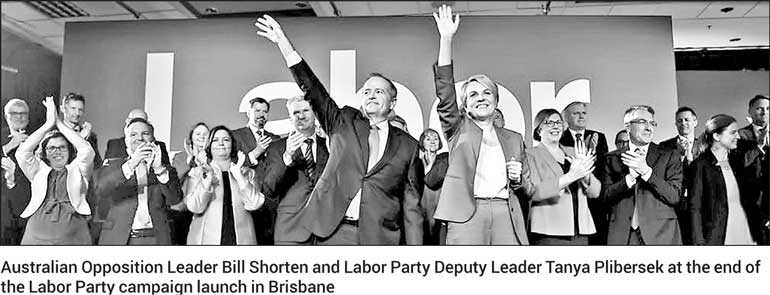Monday Feb 16, 2026
Monday Feb 16, 2026
Saturday, 11 May 2019 00:10 - - {{hitsCtrl.values.hits}}

 Does Australia need change? This is the key issue at the forthcoming federal elections to be held finally on 18 May, and even before during the ongoing pre-polling. Already over a million out of 16.4 million registered voters have cast their decision.
Does Australia need change? This is the key issue at the forthcoming federal elections to be held finally on 18 May, and even before during the ongoing pre-polling. Already over a million out of 16.4 million registered voters have cast their decision.
The voters would be fundamentally voting on this issue of change, directly or indirectly, weighing the pros and cons of party policies, platforms and promises put forward by the two main players, the incumbent Liberal National Party (LNP) and the opposition Australian Labor Party (ALP).
The leadership or the leadership style also might play a role in the choice between the ‘same versus change’ scenarios.
Same versus change
Australia is one of the most enlightened democratic systems with compulsory voting after the age of 18. However overtime, the confidence in the system has deteriorated because of meaningless leadership struggles, personalities taking over policies, the neglect of the needy and vulnerable, and relative deterioration of political ethics. Percentage of satisfaction has deteriorated from 80% in 2008 to 40% in 2018. (Museum of Australian Democracy).
Since the nominations for the present elections on 23 April, five candidates have had to withdraw from the contest, after exposing their unethical or unprincipled positions and pronouncements. This reveals not a weakness but the strength of the overall working of the democratic pressure. Among the average voter, there is a tendency to move towards credible independent candidates for similar reasons.
Therefore, it is not merely a government change that the voters would be considering this time, but policy change and a change in future directions. This has given a slight edge towards the Labor in my observation, apart from my liking for Labor policies.
If the LNP wins as in the case of past two elections in 2016 and 2013, the same neoliberal policies would continue, with some new promises and minor changes. Only the leader, Scott Morrison and some others are new, yet with old hats. And if the opposition Labor wins, it appears that there would be some fundamental changes to economic policies, social welfare and particularly climate change targets.
Labor is promising to reduce emissions that pollutes the environment by 45% by 2030, and zero pollution by 2050. If those are achieved, undoubtedly Australia would become a great futurist nation, and an exemplary icon for other nations. The Liberals are not only sceptical about those climate change targets, but ask about a cost-benefit analysis saying that it is not achievable or perhaps not necessary.
That is why a Liberal win at the elections would result in the same old story of environmental pollution and natural disasters.
Class issues
There are ‘class issues’ that have emerged during the election campaign. The Labor claims that the Liberals are catering, by and large, to only the ‘top end’ of society. Tax concessions to multinationals, tax cuts to big business, misplaced ‘negative gearing’ and ‘franking credit’ are the examples. The Liberal argument is that these are necessary for ‘capital accumulation’ and further strengthening of the economy.
When the Labor leader, Bill Shorten says, ‘A Fair Go for Australians,’ the Liberal leader, Scott Morrison, says ‘A Fair Go for Who Have a Go.’
The latter is actual words of Morrison in several public pronouncements that I have heard. Even if he means to encourage who are ‘investing, entrepreneurial or hardworking,’ it obviously neglects the vulnerable, helpless and the needy.
Touting of purely a free-market or a neoliberal capitalist system are the major planks of the Liberals. Under such a system, unfortunately all are not fairly placed even in finding gainful employment, let alone investing or starting businesses. What are available at present are mostly causal jobs and thus one has to obtain at least two jobs just to make day-to-day ends meet.
I have a neighbour who goes in his car in full suit for a security job, and then on some nights he takes his motorcycle attired in a peculiar dress for a food delivery job. This is a general pattern. The young woman whom we see at the counter of our family doctor’s medical centre, on some days appears at the Coles supermarket as a sales girl.
The Liberals promise that they would create 1.25 million new jobs over the next five years. That may be genuine. But what kind of jobs is the question? Would they be stable? Would they give the young or the old a living wage with some stability? These are the questions at this elections, among other longer term and fundamental issues pertaining to climate change, renewable energy and sustainable development that people are weighing.
We have a known Sri Lankan family whose son has graduated with a degree in health sciences but after applying for 70 jobs, he has been invited for interviews only for five. Those are of course for stable and professional jobs. There are many other known stories of graduates finding it difficult to find stable employment. Most of the graduates are left with unstable and temporary jobs as a result.
During the last five years, the profits of companies have increased by nearly 40%. But wage increases are below 5%, mostly through formal increments in the public sector, while wages in many sectors have just stagnated. This is why that some sort of class polarisation has emerged, among other election issues, this time at the federal elections.
Continuity and change
All democratic countries need continuity and change. In the case of Australia, there are no fundamental controversies about the constitution, electoral system, national security, foreign policy or democracy versus authoritarianism. Except in random cases, there are no major threats of terrorism in the country either. The security commitments on the part of both parties are more or less the same. These are mainly the results of bipartisan policies developed through ‘give and take’ and building consensus.
In the case of border security and ‘boat people,’ the ALP appeared quite lenient before 2013. Through experience however, they have openly changed policies while keeping humanitarian concerns of the refugees in mind – particularly of the sick, children and women. Border security is something on which many countries require stable bipartisan policies considering the volatile international circumstances and global terrorism.
Even during the present election campaign, the two parties appear to absorb each-others positive policies although in uneven terms. When the Liberal Party promised to expand on the pharmaceutical benefit scheme (PBS), the Labor quickly absorbed it. However, the Liberals apparently cannot do so on the broader health front or in education, given the costs involved, as they say.
During the last debate between the two leaders, Morrison and Shorten, on 8 May at the Press Club, the latter asked the former whether the Liberals would agree to extend the concessions that the Labor has offered to cancer patients to get rid of enormous out of pocket expenses. The answer of Morrison was that they would consider, if the figures are available! Liberals appear to be obsessed with accountancy and not policies.
What the Australian people are most detesting is the policy changes ‘back and forth’ when governments change at periodic elections. This is not good for stability or forward planning both on the part of the country and the people. Perhaps this elections might show a breakthrough.
New directions
The vision of the present Labor, exemplarily united as a team compared to Liberals, is not just to turn back the clock to pre-2013 period (Julia Gillard and Kevin Rudd) or even pre-1996 period (Bob Hawk and Paul Keating), but to move beyond in constructing a fairer society to all Australians. As the ceremonial campaign launched in Brisbane showed, the present Labor has all the blessings of all past leaders and PMs, Bob Hawk, Paul Keating, Kevin Rudd and Julia Gillard.
The Labor has given a fair share for women in the leadership, shadow cabinet and party organisation.
Under the present circumstances, the Labor is giving priority to the needs and aspirations of the working and the middle classes. The middle class however means even the small businesses and entrepreneurs. There are vast incentives offered to small businesses, including tax concessions. Bill Shorten declared that a fairer society means win-win solutions even for the big businesses or multinationals, if they pay fair taxes, use renewable energy, and work for a better society with social conscience.
This is the first time in the Western world, after some catastrophic practices of neoliberalism since late 1980s, that a labour or a social democratic party attempting to reverse the world trends, not just to go back to welfare-state of pre-1980s, but to look beyond and construct a fairer and a caring society for all humans living in a particular territory. The British Labour, under the leadership of Jeremy Corbin, is also set to go in similar directions when the British elections are on in May 2022, if not before.
If the Labor wins at the forthcoming elections, it would be significant not only for Australia, but for the world at large.